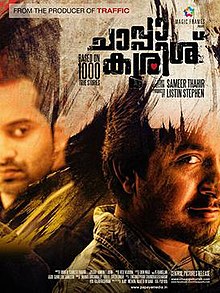There was a time when Mani Ratnam was a master of his art. He took the best out of every actor; even actors about whom we thought were average have performed beyond our expectations in Mani Ratnam films. When melodrama was the signature characteristic of Tamil cinema or Indian cinema in general, Mani Ratnam’s characters did it subtly, spoke not just with their words, and they went straight to our hearts. Well, that’s a thing of past now.
(Possible spoilers ahead)
In “Chekka Chivantha Vaanam”, you see the director struggling to keep the audience consistently engaged with the characters. Even the characters are emotionally disconnected with each other (and I’m not talking about the plot’s context). There is a scene when Jyothika’s character is dying and Aravind Swami is confessing something to her. This supposedly is a very emotional scene, yet it is one among the many cold scenes in the movie.
The first half of the movie was totally racy though. So much so that you wouldn’t realise how that one hour went. Mainly thanks to the towering performance of Prakash Raj (that actor is a gem!). But once the initial plot for each character is set, the director is clueless about how to take this forward on the shoulders of the three leading actors. Though at the end he gains some hold on the craft.
Jyothika is the only consistent performer in the movie, other than Prakash Raj and Jaya Sudha. Vijay Sethupathi does justice to his role, but it is not convincing enough that all his subtlety throughout the film was for the climax. Aravind Swami’s performance is not what I would except in the company of Mani Ratnam but maybe that is expecting too much.
Rahman’s background score is gripping at times but falls to melodramatic lows at times. And please don’t sing anymore, Rahman! You startled me with your voice during that funeral scene of Ethi’s wife.
Mani Ratnam does a Ram Gopal Varma with “Chekka Chivantha Vaanam” and that is not what his fans go to theatres for. I hope he doesn’t forget that even if the movie does well in the box office.
 I have a friend who used to text me (and other friends in our local friends group) Sardar jokes. He took great pleasure in sending those texts and we enjoyed reading them. When we met, he always had a few sardar jokes to share. He enjoyed telling each of these sardar jokes and if not us, he had always laughed out aloud on those jokes himself. Rest of us even began to carefully choose other topics to talk about, so we can save ourselves from the sardar jokes. 🙂 But Sardar jokes are just too good to skip. I think what makes them popular is that it has certain amount of innocence to it. Or furthermore, it has a bit of us or our daily life in it. Something that we can relate to. It is this side of Sardar jokes that Niranjan Ramakrishnan is exploring with his book titled, “Bantaism: Philosophy of sardar jokes“.
I have a friend who used to text me (and other friends in our local friends group) Sardar jokes. He took great pleasure in sending those texts and we enjoyed reading them. When we met, he always had a few sardar jokes to share. He enjoyed telling each of these sardar jokes and if not us, he had always laughed out aloud on those jokes himself. Rest of us even began to carefully choose other topics to talk about, so we can save ourselves from the sardar jokes. 🙂 But Sardar jokes are just too good to skip. I think what makes them popular is that it has certain amount of innocence to it. Or furthermore, it has a bit of us or our daily life in it. Something that we can relate to. It is this side of Sardar jokes that Niranjan Ramakrishnan is exploring with his book titled, “Bantaism: Philosophy of sardar jokes“. ‘
‘
